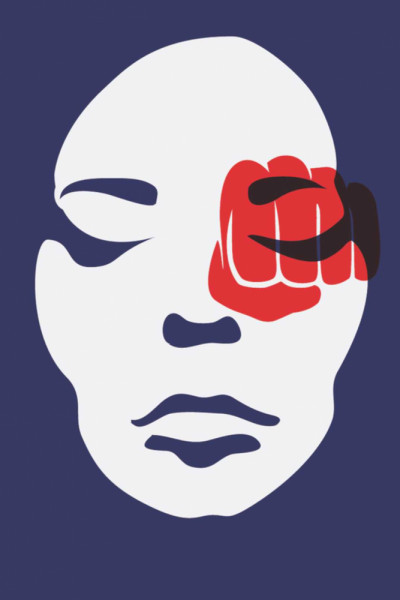Is abusive behaviour a choice?

I was once called a whore. Chances are, so have you, if you're a woman.
And like me, you've probably been called other names too (and I'm sorry that you have), but this is the one I choose to focus on because this one befuddles me.
What is the intent of a statement like this? Who is being debased? Me? Sex workers?
Both are problematic, obviously. In the same way it's problematic when the word chasha, farmer, is hurled as an abuse.
Because these words have political content.
These words, they assume a certain class position, status, and power - perceived or otherwise - over the person(s) that these words are directed towards. They contain the idea of being better than the other, they contain disparagement, they contain misogyny.
In my research, I've found something else as well: status inconsistency, or in regular parlance, a battered ego.
I found that it is when status is threatened (and status inconsistency occurs) that some individuals resort to being abusive. This is more like, I theorise, when the status quo is patriarchal to begin with. And thus I found an answer to why I was called a whore. I was called a whore because that's what men call you when they can't control you, or your thoughts. That's what women call you too, when they buy into the same patriarchy that governs them.
Recent research indicates that 80 percent of a nationally representative sample of women in Bangladesh reported experiencing domestic violence in their intimate relationships. That's a lot of people. And, pretty alarming.
As good citizens what are we to do when we witness or have knowledge of such violence? Ensure that those who are or have been experiencing violence have a safety plan including a safe place to go to. This may be difficult; many individuals remain in violent relationships because they have nowhere else to go, because they're dependent on their partners. "Leaving the abuse" may render them homeless. These are valid reasons for which many women don't and can't access help. However, there are organisations such as BNWLA and ASK that one can reach out to for help.
"Violence need not be physical for it to be violent. I will invoke what my colleague Annette Semanchin-Jones recently said: emotional violence may be far more harmful than one instance of physical abuse.
At the same time, we have to recognise that individuals who abuse their partners (or others) need various types of therapy - including anger management and cognitive behavioural therapy (CBT). CBT is a good choice because they need a shift in their mindsets, they need to let go of misogyny and sexism, they need to reframe their negative and dehumanising ideals about the people that they abuse, they need to stop believing in patriarchy. They need to learn new behaviours to replace the abusive ones. They need to learn what to do when they get angry.
This is to say that people can change but success depends on whether they voluntarily seek help or are coerced to, for example by the courts. Research shows that voluntary participation in interventions is far more likely to be successful than mandatory participation. But how do we know if people have actually changed?
Various scholars have developed guidelines to assess change among those with a history of violence. One that I like is Bancroft and Silverman's guideline which incorporates elements of restorative justice. They propose assessing the following questions when estimating the degree of change:
-
Has he made full disclosure of his history of physical, sexual, and psychological and other forms of abuse?
-
Has he recognised that abusive behaviour is unacceptable?
-
Has he recognised that abusive behaviour is a choice?
-
Does he show empathy for the effects of his actions on his partner and children?
-
Can he identify his pattern of controlling behaviours and entitled attitudes?
-
Has he replaced abusive behaviours with respectful behaviours and attitudes?
-
Is he willing to make amends in a meaningful way?
-
Does he accept consequences for his actions?
I like this framework because it ensures that there is cognitive engagement on the part of the individuals who want to change, who can then demonstrate that they've unlearned their abusive behaviours, thus distancing themselves from such behaviours, with the understanding that behaviours can change; that it is important to repent, and take responsibility for actions that have harmed others; and that their use of violence is not "who they are."
But individuals with a history of violence aren't the only ones who need to change their mindsets. The society as a whole does. I say this because it's not uncommon for people to brush aside or even condone violence and abusive behaviours, particularly of people they know and love, and against people and groups they don't care for.
I am going to point to a couple of reasons.
One, they support individuals who abuse their partners because they don't know what else to do. They feel the need to be supportive, as they perhaps should, but they don't know how to do that and be helpful at the same time, and thus become enablers. And therein lies the problem; the message that enablers send is that it's okay to abuse people. This is not helpful for anyone involved. Friends and family of individuals who abuse are especially well placed to help individuals recognise the problem with their behaviour, and encourage them to change that behaviour. Such enablers need to understand that being supportive need not equal accepting their behaviours.
Two, they themselves subscribe to the same ideals of misogyny, sexism, and patriarchy that allow the use of violence against women (and others). As such they end up victim blaming and calling into question the reasons for which violence was used in the first place. Indeed, even women believe in patriarchy. It is perhaps inevitable given that patriarchy informs the social order within which we live.
And a third reason is that violence and subjugation of women is normalised. It's so pervasive that it's normal. When it happens, people are no longer shocked. And more times than not, people justify violence against women. Even women.
Fourth, people don't know who to blame, as if we have to blame someone. In my interviews with women, I have found many women term it as a problem with their fate, not the men or their behaviours in question. It's one way of coping with the violence in their lives, particularly if they see no way out of it.
Fifth, women who have withstood abuse in their previous relationship(s) might sometimes bring that same abuse and violence into their new relationship(s), especially when unmitigated through lack of therapy, where they might use violence - physical or emotional - which they have learned as "conflict resolution"which in turn might be reciprocated, resulting in further use of violence.
Violence need not be physical for it to be violent. I will invoke what my colleague Annette Semanchin-Jones recently said: emotional violence may be far more harmful than one instance of physical abuse.
As I recall all the khota, jabs, that I've received in my life, many of which I have found difficult to forget, I recognise that that is a form of emotional abuse.


 For all latest news, follow The Daily Star's Google News channel.
For all latest news, follow The Daily Star's Google News channel. 



Comments